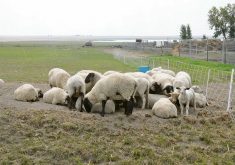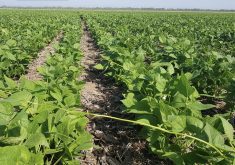SARNIA, Ont. — Plans are moving forward to build a dextrose plant in Sarnia that would take as much as 75,000 tonnes of corn stover and wheat.
According to a joint release from the Cellulosic Sugar Producers Co-operative, Comet Biorefining and Bioindustrial Innovation Canada, crop residues from 55,000 acres of farmland within 100 kilometres of the plant will be needed.
The co-op recently announced the launch of an equity campaign. Participating farmers will be asked to buy subscription shares, which will give them voting rights in the co-operative, and sign an agreement committing acres of biomass and an investment in the venture.
Read Also

Farming Smarter receives financial boost from Alberta government for potato research
Farming Smarter near Lethbridge got a boost to its research equipment, thanks to the Alberta government’s increase in funding for research associations.
In return, growers will be paid for each tonne of biomass they deliver and patronage out of the plant’s cash flow.
“Producers need to take an active role in developing new markets based on new technologies coming to market as we partner with Comet Biorefining,” said Dave Park, the co-operative’s president and a Lambton County farmer.
According to the company’s website, Comet has developed a low-cost conversion method that replaces the traditional pre-treatment of biomass and reduces enzyme loading.
The resulting dextrose, which is a clear syrup, is to be used for industrial purposes.
Comet founder Andrew Richard said the processing plant is de-signed to produce 60 million pounds of dextrose a year, which is to be marketed domestically and exported.
“We chose Sarnia … for the location for the plant for several different reasons, including access to infrastructure and facilities and proximity to feed stocks and proximity to end users,” Richard said.
BIC executive director Sandy Marshall said his organization, which helps take innovative ideas to commercialization, has been working with the co-operative’s proponents since 2012.
BioAmber, a company specializing in the production of bio-succinic acid, will be one of Comet’s customers, according to a Comet release. Succinic acid is known as a building block chemical with many applications.
Marshall expects that demand for biomass will grow, as will Sarnia’s reputation as part of the emerging bio-economy.
“We have a number of other companies that are interested in starting their first plant, and Sarnia is on their short list,” Marshall said.
“As we build the bioeconomy, we anticipate the need for hundreds of thousands of tonnes of sugar.”
Plans call for the Comet facility to be opened in 2018. Comet currently operates a demonstration plant in Rotondella, Italy.
Besides BioAmber, the Sarnia area is also home to facilities owned by Box Corp., which is in the energy business, and Suncor, which operates an ethanol plant, Marshall said.

















